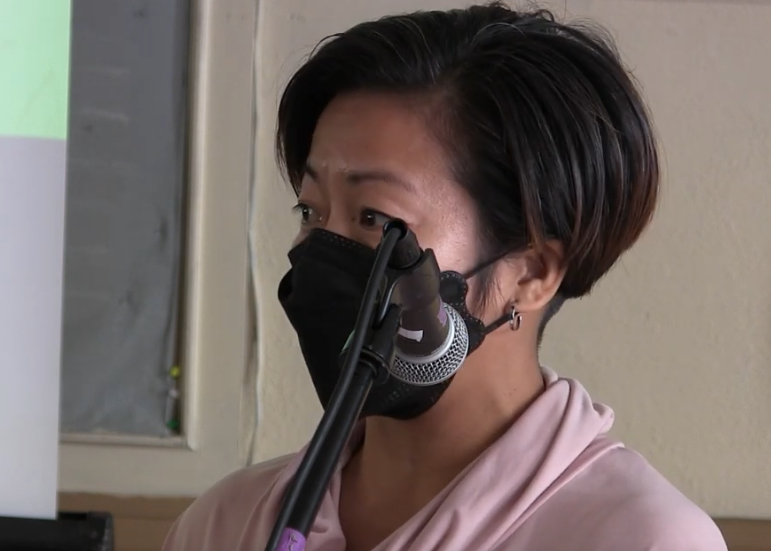Summary
The healthcare system faces challenges highlighted by the COVID-19 pandemic, necessitating change. Issues such as healthcare disparities and limited access to quality care require attention. Equitable and multicultural healthcare for all is crucial, as is ensuring proper protective equipment for healthcare workers. Additionally, it is important to prioritize patient care over profit-making in hospitals and nursing homes. Urgent action is needed to create a healthcare system that effectively serves the needs of individuals and addresses these issues.
Transcript
(The next speaker comes from Long Beach. She is a leader in the Filipino community. Throughout this whole pandemic, it’s been horrible how healthcare workers have been at the front lines, and many have sacrificed their lives. Geline is a registered nurse who works for the Public Health Department in Long Beach, and she’s going to address some of that and speak about how AV 1400 will literally save the lives of her community and colleagues.)
Thank you, and I just want to say I love being in this kind of space. I haven’t been in a multicultural space like this in such a long time. I’m glad I’m here. Please bear with me because I haven’t done this in a long time.
So, good afternoon again. My name is Geline. I’m a registered nurse, and currently, I work as a public health nurse for the City of Long Beach. I’m also a founding member of FAHWA, which used to be Filipino American Healthcare Workers Association, now also known as Fostering Aid through Health Workers Alliance. This nonprofit raises funds to support and conduct medical missions and educational trips to various countries around the world.
So, I was invited to talk about the experience of Filipinos and Filipino Americans under the current healthcare system. Some may not know, but everyone must have noticed when you go into a health clinic or to a hospital, that a lot of healthcare workers are of Filipino descent. It has even been a running joke that if you’re Filipino, then you must be a nurse. But the impact of the COVID-19 pandemic on the Filipino healthcare community is definitely not a funny joke.
According to National Nurses United, over 3,200 healthcare workers have died in the U.S. More than a quarter of those who have perished were Filipino. At the health department where I work, when the pandemic hit, most of the nurses there were reassigned to COVID response.
One of my tasks was to follow long-term care facilities or nursing homes and help them manage their COVID cases and outbreaks. COVID first really hit home when we had our first healthcare worker death, a nursing supervisor in one of our nursing homes. This was sometime in July 2020. He was 29 years old and Filipino-American. It hit even closer to home when my own brother passed away in September of 2020 after being in the hospital and on a ventilator for a month. He was a healthy 60-year-old and also a healthcare worker. He was a licensed vocational nurse or an LVN who used to work for the L.A. County Jail system. As a nurse, COVID does not care whether you’re 29 or you’re 60, but it has definitely impacted certain communities more than others.
And after almost two years, even though the number of cases has been lower recently, we have not yet succeeded in ending the pandemic.
[Music]
Needless to say, the current healthcare system we have in the US and here in California has failed us. It has failed all of America, especially those who are already marginalized because of their social status.
It has failed people of color, Native Americans, Blacks, Latinx, Asians, and Pacific Islanders, etc. It has failed immigrants, working people, our mothers, fathers, brothers, sisters. It has failed our families.
I used to be an ICU nurse, but when I started working in public health, I better understood why my patients end up in the ICU in the first place. Sometimes they keep coming back, and we called them the frequent flyers. Pre-pandemic, I used to visit the homes of chronically ill patients and try to help them navigate the system. It’s a difficult job because it’s a broken system.
I’ve seen the lack of access to quality healthcare services, especially among immigrants, the homeless, the unemployed, the undocumented. Most of them people of color. Many of our patients have not seen a doctor in years. Without us, they won’t know what to do to address their health concerns. But there’s only so much we nurses can do. As much as we would like to help our patients get care, a lot of times it’s impossible under a broken system.
Even before the pandemic, it has always been complicated, difficult, and many times impossible to receive quality healthcare for many of us. The pandemic may have opened our eyes to these disparities, but nothing will change unless we create the change together.
AB1400 aims to provide free, equitable, accessible, multicultural, multilingual quality healthcare to all Californians. This is a step in the right direction and may possibly be a blueprint for other states to follow to fix this broken healthcare system.
Health is a human right, and everyone deserves a healthcare system that truly serves the people. I urge you all to call your legislators now and support AB1400. For Filipinos, for Filipino Americans, Asians, and Asian Americans, for your people, for our people, for all of California.
Like we say in our language, “MAKIBAKA!” That means “dare to struggle, be not be afraid, do not be afraid.”
Thank you.
